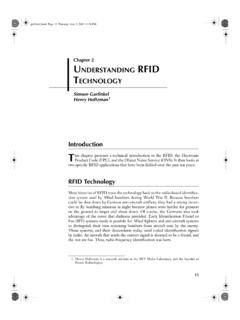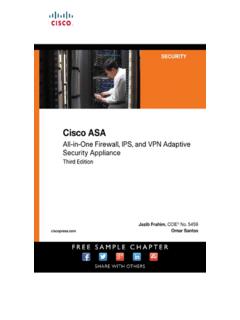Transcription of Forming and Managing an Incident Response Team
1 04 IR_Ch 4 10/17/01 10:31 AM Page 73. 4. Forming and Managing an Incident Response team F ROM TIME TO TIME, WE'VE MENTIONED THE word team in the process of covering various topics related to Incident chapter delves into Forming and man- aging an Incident Response team what a Response team is, the rationale for Forming an Incident Response team , major issues that must be addressed, and special manage- ment topics are particularly important. Many Incident Response efforts fail or flounder because of mistakes made in Forming and/or Managing a Response chapter again presents the authors' perspectives and real-life experiences in dealing with the many issues related to this will begin by considering the most fundamental part of an Incident Response team the meaning of the term itself. What Is an Incident Response team ? In many contexts, you will see Incident Response equated with Incident Response team . Equating these two constructs might superficially appear logical, but doing so often constitutes a departure from reality.
2 Why? People who know little or nothing about the process of Incident Response often become involved in dealing with security-related incidents. Users are a classic example. 04 IR_Ch 4 10/17/01 10:31 AM Page 74. 74 chapter 4 Forming and Managing an Incident Response team Suppose a worm infects numerous systems. Users might collaborate to analyze what has happened and to combat the worm, yet they can hardly be called an Incident Response reason is that an Incident Response team is a capability responsible for dealing with potential or real information security incidents. A team is assigned a set of duties related to bringing each security-related Incident to a conclusion, ideally in accordance with the goals of the organization it serves. The difference, therefore, between individuals who are dealing with an Incident and an Incident Response team is the mission in terms of job-related responsibilities assigned to each.
3 Individuals might some- times become involved in dealing with incidents, but an Incident Response team is assigned the responsibility of dealing with incidents as part or all of the job descrip- tions of the individuals involved. How many individuals must be involved in an Incident Response effort for them to collectively be considered a team ? A team consists of one or more individuals. You might ask how a team can consist of one individual when one person is not, in most situations, sufficient to deal adequately with most answer is that one individual can effectively serve as the coordinator of efforts by a number of people. When Incident handling efforts are finished, the others involved in the Incident are released from any responsibilities they might have had in dealing with Incident . But the team member has the ongoing, day-to-day responsibility of handling incidents and will have to deal with the next Incident that occurs.
4 Many Incident Response teams have many team members, each with a specialized role. Consider, for example, the Computer Emergency Response team Coordination Center (CERT/CC). Some of the many members of this team are engaged in daily operations, receiving reports of incidents and attempting to identify the type, source, impact, and other facets of security-related incidents that are reported. Others attempt to deal with vendors to close known vulnerabilities in operating systems, applications, and so forth. Still others examine data to identify and project Incident trends, some- thing that is more related to research. Outsourcing Incident Response Efforts Should an organization have its own Incident Response effort, or should it contract with a consultancy or contractor to provide Incident Response support? The answer in most cases is that it depends on a num- ber of basic factors. Let's consider the alternatives.
5 Hiring a Contractor or Consultancy. One of the many advantages of contracting with a commercial inci- dent Response team is that the overall cost of dealing with security-related incidents is likely to be lower. Why? Incident Response personnel contractors or consultants need to deal only with incidents that occur. Unless there is a plethora of incidents, there is no need to keep regular personnel around to wait for incidents to occur. Additionally, contractors or consultancies usually offer special kinds of expertise that are often not available within any particular organization. Be careful, however. Many consultancies and service providers offer Incident Response services, some of which are far superior to others. Be sure to ask for references, preferably from current and ex-customers, before signing any contract for Incident Response services with any consultancy or service provider. 04 IR_Ch 4 10/17/01 10:31 AM Page 75.
6 Why Form an Incident Response team ? 75. Using In-House Capability. The major rationale for developing an in-house Incident Response capability is to handle incidents in accordance with the policy and cultural/political needs of an organization. Security-related incidents are potentially very sensitive and political; an in-house capability is likely to deal with them in a manner that is most advantageous to the organization (provided, of course, that the individuals within this capability understand the culture and politics of the organization). Why Form an Incident Response team ? Why might some organizations want to form an Incident Response team ? This section focuses on some possible reasons. Ability to Coordinate In general, it is easier to coordinate the efforts of individuals who are on an Incident Response team because they generally report to the team leader, who can direct them to become involved in one particular activity or another.
7 Expertise Information security incidents are becoming increasingly complex; Incident handling experts are thus becoming increasingly gurus always come in handy when incidents occur, but pure technical expertise is not enough when it comes to many incidents. Having helped with many previous incidents, knowing what policies to consider and procedures to follow, and so forth are just as critical, if not more criti- cal, than pure technical skills. One of the best ways to build expertise is to serve on a dedicated Incident Response function. Efficiency A team builds a collective knowledge that often leads to increased efficiency. An iso- lated individual can easily go astray in dealing with an Incident , but collective wisdom accrued within a team can help Incident Response efforts get back on track. Additionally, a team (as opposed to any individual or a few independent individuals) is more likely to develop and follow procedures for Incident Response , something that boosts efficiency.
8 Ability to Work Proactively Being proactive (that is, adopting measures that address Incident Response needs before incidents actually occur) is one of the keys to a successful Incident Response effort. Training users and system administrators to recognize the symptoms of incidents and what to do (as well as what not to do) is a good example of a proactive effort. Although it is possible for any number of individuals to engage in proactive efforts, 04 IR_Ch 4 10/17/01 10:31 AM Page 76. 76 chapter 4 Forming and Managing an Incident Response team having a team increases the likelihood that proactive efforts will occur. Having a team allows the luxury of having different persons specialize in different functions, especially in proactive activity. Additionally, successful proactive efforts are often the byproduct of successful collaboration by teams; individuals are not as likely to think of and carry out successful proactive activity.
9 Ability to Meet Agency or Corporate Requirements Another advantage of having an Incident Response team is that a team is generally better suited to meeting agency or corporate main reason is that a team has individuals who are geared toward the same mission. Note that some government agen- cies and corporations go one step further in that they require (through a management directive or a policy statement) that an Incident Response team be formed. Serving a Liaison Function Response teams are better suited to serving a liaison function than are individuals because outside entities are not likely to learn of and/or be motivated to deal with individuals. Having a team identity provides extra external visibility as well as credi- bility, both of which are more suited to the liaison function. Furthermore, a team , . in many respects, commands a certain degree of legitimacy within internal and external organizations.
10 Ability to Deal with Institutional Barriers Institutional politics invariably affect virtually any effort that occurs within an institu- tion. Incident Response teams (or at least Incident Response teams sanctioned by senior management), however, provide at least some degree of immunity from politics that provide barriers to Incident Response main reason is that these teams are likely to have more authority to take action such as shutting down systems that have been compromised at the superuser level than individuals. Additionally, teams often involve individuals from a cross-section of organizations and groups, making them more politically palatable within a range of an organization's divisions and groups. Issues in Forming a Response team Forming an Incident Response team generally is not as easy as it superficially might individual(s) charged with this responsibility must deal with many key issues, including policy, whether or not a team is really necessary, defining and com- municating with a constituency, defining functional requirements, defining the role of the Incident Response team , staffing the team appropriately, and creating and updating operational section discusses these issues.

















